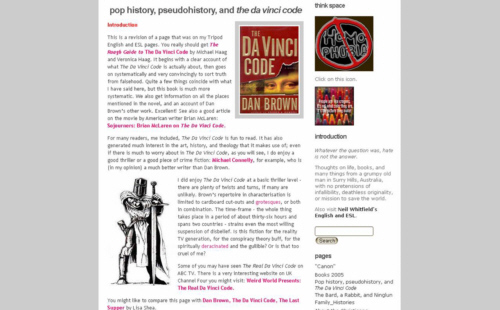This went up on my personal site on 2 May 2006.
I mentioned yesterday that I was rereading Aldous Huxley’s 1932 dystopia, using the Vintage Classics edition of 2004. David Bradshaw’s 1994 preface to that edition really is very good on the novel’s context and on its ambivalence: one is never sure whether Huxley is warning us about or celebrating his “Brave New World.” I really think the novel is about the search Huxley was on as much as anything else; certainly Huxley’s later career would seem to bear that out.
Also, it has to be said that Brave New World really is not a very good novel, with its crashing coincidences and its deeply unbelievable Savage and its great dollops of Cardinal Newman and others. I rather like Bradshaw’s idea that Linda is based on D H Lawrence’s wife Frieda von Richtofen.
Those studying the novel should head for somaweb.org, which is just about as comprehensive a set of ideas and links as you could get. One of those links is to the rather amazing A Defence Of Paradise-Engineering, whose theme really seems to be that we all need soma but just need to get the formula right. Another links to an essay by Ming Li, “The Cost of Stability in Brave New World“. I like this bit:
Homer Simpson once said, “God has no place within these walls, just as facts have no place within organized religion”.
See also Answers.com, which is also excellent on the novel.
[Ming Li’s essay seems to have gone, a pity. You may instead look at Snow Crash vs. Brave New World: Visions of the Future by Eric Richardson, Columbia, South Carolina. He quotes more extensively than I did from Ming Li’s essay.]
NSW HSC students read Brave New World in conjunction with Blade Runner (2000 Director’s Cut), that quite amazing movie dystopia. My link refers you again to Answers.com, which gives you just about all you need. HSC students are asked to consider both texts as part of a unit called In the Wild, the details of which you may read there. It is in fact a rather interesting unit. An alternative study of the same topic may be undertaken using David Malouf’s An Imaginary Life (a much better novel than Brave New World) and the poetry of Wordsworth. I have dealt with that one on my on another post here.
On my personal blog this generated a bit of discussion: Look here. I moderated my view of Brave New World thus: “…while I still think BNW is far from the ‘world’s greatest novel’, it is an interesting parable, and does raise issues that even the brightest students can grapple with — perhaps for the rest of their lives! I know I am still grappling with them.”
See also Watched Blade Runner (Director’s Cut) last night on my personal blog.
2009-2012 HSC
Blade Runner is now paired with Frankenstein by Mary Shelley, and the emphasis is different from “In the Wild”. Even so, much of the material above is useful still.









You must be logged in to post a comment.